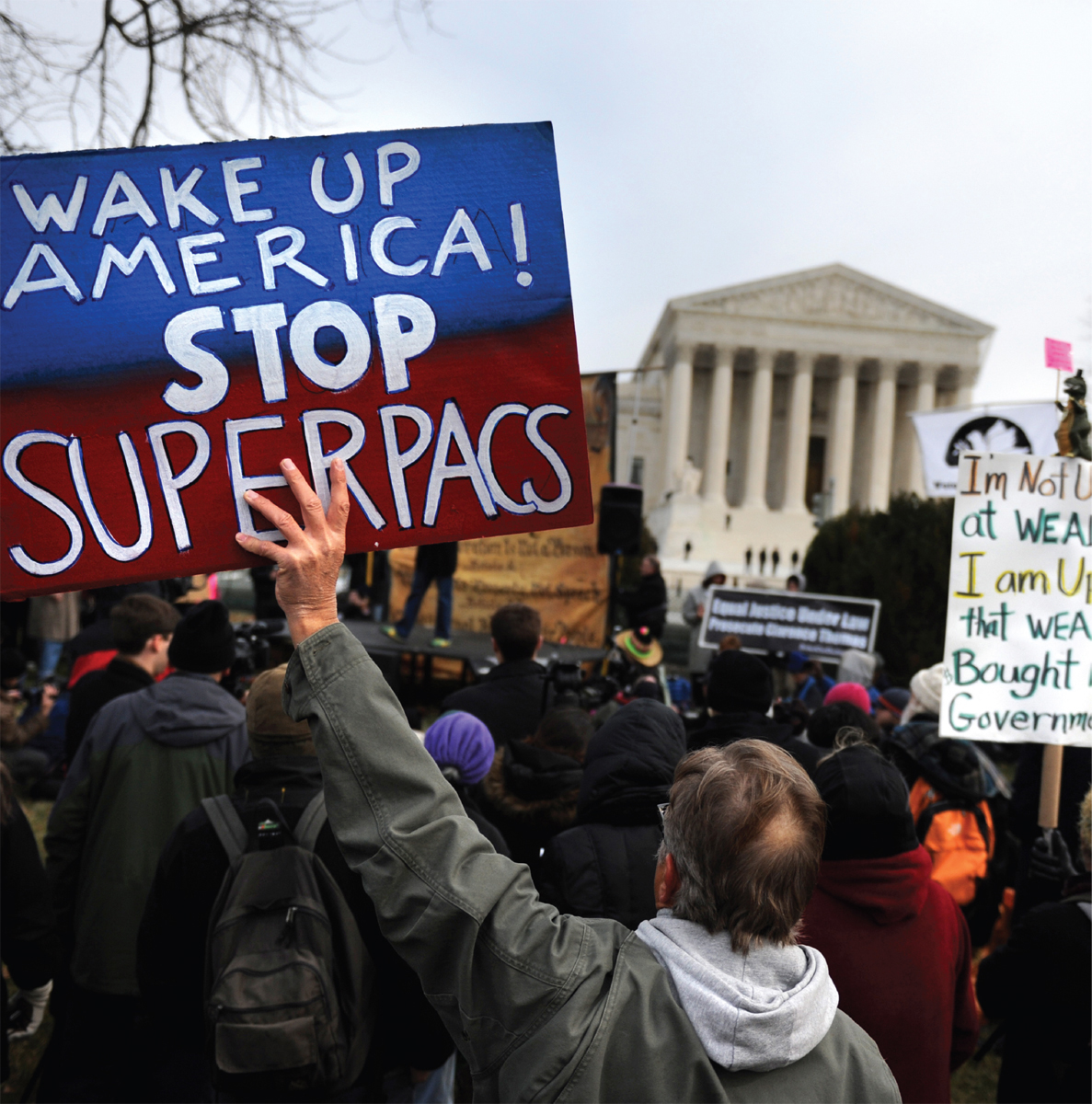Chapter 16 Introduction
DEMOCRATIC EXPRESSION
AND THE MASS MEDIA
16
Legal Controls and Freedom of Expression
The Origins of Free Expression and a Free Press
Film and the First Amendment
Expression in the Media: Print, Broadcast, and Online
The First Amendment and Democracy

Politicians and their constituents can talk, but money as speech speaks much louder. Aspects of our present political system amount to a legal pay-
Congress shall make no law respecting an establishment of religion, or prohibiting the free exercise there of; or abridging the freedom of speech, or of the press; or the right of the people peaceably to assemble, and to petition the Government for a redress of grievances.
In other words, it says nothing explicitly about money. Yet money now counts as speech, protected by the First Amendment. So how did we end up here?
Ironically, it started with Congress’s intention to control the amount of money in elections. In 1974, emerging from the Watergate scandal (President Nixon’s illegal tactics in the 1972 election), Congress amended federal election law to further limit campaign contributions. Two years later, in Buckley v. Valeo (1976), the U.S. Supreme Court suggested for the first time that political contributions count as speech. The court argued that restrictions on campaign money “necessarily reduce[d] the quantity of expression by restricting the number of issues discussed, the depth of the exploration, and the size of the audience reached. This is because virtually every means of communicating ideas in today’s mass society requires the expenditure of money.”
Over the ensuing years, Congress has tried to again rein in campaign finance with new laws, but federal courts, beholden to the idea that money equals speech, have always struck them down. This brings us to the current state of our national elections. The two main political parties and their supporters spent an estimated $6 billion on campaign advertising for the 2012 election, more than doubling the previous record. The main reason for the new record was the unlimited amount that corporations and rich individuals could now spend, thanks to another decision by the Supreme Court, Citizens United v. Federal Election Commission (2010). The five-
While the Supreme Court decision ran counter to public opinion, many advocates on the political Right and some on the Left offered that the First Amendment means what it says: “Congress shall make no law.” Traditional First Amendment supporters like Gene Policinski of the First Amendment Center argue that the “good intentions” behind the idea of limiting campaign spending “don’t justify ignoring a basic concept that the Supreme Court majority pointed out in its ruling: Nothing in the First Amendment provides for ‘more or less’ free-
An advantage in advertising spending is only one of many variables; Obama still won reelection in 2012 despite more national party, Super PAC, and campaign spending.4 Nevertheless, those with limited means are at a clear disadvantage compared to those who have money when it comes to buying expensive commercial speech and shaping the direction of a presidential campaign. Harvard Law School professor Lawrence Lessig argues that money corrupted American politics long before the Citizens United ruling. “Politicians are dependent upon ‘the funders’—spending anywhere from 30 percent to 70 percent of their time raising money from these funders,” he wrote. “But ‘the funders’ are not ‘the People’: .26 percent of Americans give more than $200 in a congressional campaign; .05 percent give the max to any congressional candidate; .01 percent—
THE CULTURAL AND POLITICAL STRUGGLES OVER WHAT CONSTITUTES FREE SPEECH or free expression have defined American democracy. In 1989, when Supreme Court Justice William Brennan Jr. was asked to comment on his favorite part of the Constitution, he replied, “The First Amendment, I expect. Its enforcement gives us this society. The other provisions of the Constitution really only embellish it.” Of all the issues that involve the mass media and popular culture, none is more central—
The current era is as volatile a time as ever for free-
In this chapter, we will:
- Examine free-
expression issues, focusing on the implications of the First Amendment for a variety of mass media - Investigate the models of expression, the origins of free expression, and the First Amendment
- Examine the prohibition of censorship and how the First Amendment has been challenged and limited throughout U.S. history
- Focus on the impact of gag orders, shield laws, the use of cameras in the courtroom, and some of the clashes between the First Amendment and the Sixth Amendment
- Review the social and political pressures that gave rise to early censorship boards and the current film ratings system
- Discuss First Amendment issues in broadcasting, considering why broadcasting has been treated differently from print media
- Explore the newest frontier in free expression—
the Internet
One of the most important laws relating to the media is the First Amendment (see pages 537–538 for its full text). While you’ve surely heard about its protections, do you know how or why it was put in place? Have you ever known someone who had to fight to express an idea—